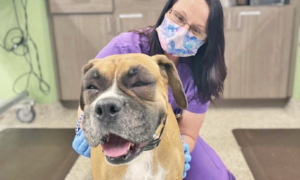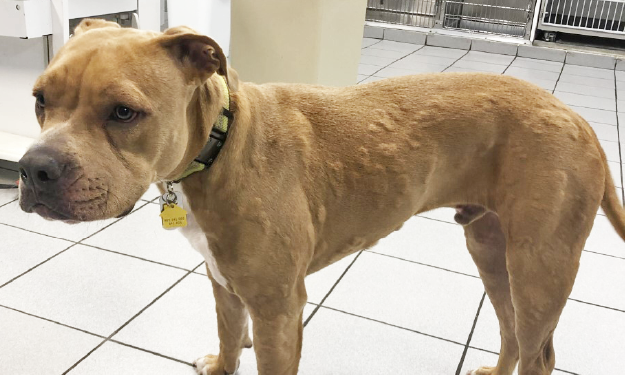Hives in Dogs: What To Do If Your Dog Experiences an Allergic Reaction
March 22, 2022
What is an allergic reaction?
An allergic reaction can occur in response to many things in our daily environment. The body interacts with an allergen (usually a protein of plants, food, animals, or insects) and the immune system mounts an overreaction to this allergen.
The specific allergen is often never identified in an isolated incident. If a patient is experiencing recurrent & frequent allergic reactions, referral to a veterinary dermatologist is often warranted.
Symptoms of an allergic reaction in dogs
As a result of this overreaction, a constellation of symptoms may be present. The most common symptoms of an allergic reaction in your dog are:
- hives (patches of red, swollen, itchy welts or bumps) also known as urticaria
- facial angioedema (muzzle or eye swelling)
- itching
- gastrointestinal signs (vomiting and/or diarrhea)
These symptoms may be focal (one part of the body) or generalized. In mild allergic reactions, GI signs are appreciated a few days after the initial symptoms of hives and facial swelling. In severe allergic reactions, acute and severe vomiting and diarrhea may be appreciated.

A dog that presented with facial swelling to Premier – Orland Park after playing outside.
In severe, or anaphylactic, allergic reactions respiratory or circulatory signs are seen. Symptoms of an anaphylactic reaction in your dog include:
- difficulty breathing
- wheezing
- collapse
Thankfully, these presentations are very rare and most allergic reactions are mild.
What to do if your pet has an allergic reaction
If you notice your pet having signs of a mild allergic reaction (facial swelling, skin hives, itchiness) you should seek veterinary care on an urgent basis. This means you should be seen that day, but you do not need to present through the emergency room (unless this is the only availability). Your primary care veterinarian or local urgent care department will be able to manage these cases.

A dog that presented with hives and a swollen muzzle to Premier – Grayslake.
In severe or anaphylactic reactions (difficulty breathing, collapse, severe/acute vomiting & diarrhea) you should seek emergency care at once and present through the closest veterinary hospital. In humans, only 1% of allergic reactions are severe. They are similarly rare in veterinary patients.
Treatment for allergic reactions
In cases of mild allergic reactions, your veterinarian will likely administer an injection of an antihistamine called diphenhydramine. In some cases, your veterinarian will also administer an injection of a corticosteroid. You may be asked to wait with your pet for a short observation period after these injections. This is to ensure your pet’s clinical signs are improving after initial treatment.
Your veterinarian will likely then send your pet home with a short course of antihistamines and/or steroids. There have been some studies that show cetirizine is a superior oral antihistamine in reducing the risk of continued dermatologic symptoms (hives & itching) as well as reducing the risk of delayed gastrointestinal signs (vomiting & diarrhea). Both diphenhydramine and cetirizine are regularly used, however.
In severe, life-threatening allergic reactions your veterinarian will obtain IV access and administer medications such as epinephrine. In these cases your pet will likely stay in the hospital for ongoing treatment and monitoring.
Monitoring at home
After minor allergic reactions, you should continue all medications as prescribed by your veterinarian. You should also continue monitoring for non-resolution or worsening of symptoms. If this occurs despite treatment, you should have your pet reevaluated.
Written by Alison Bayerle, DVM